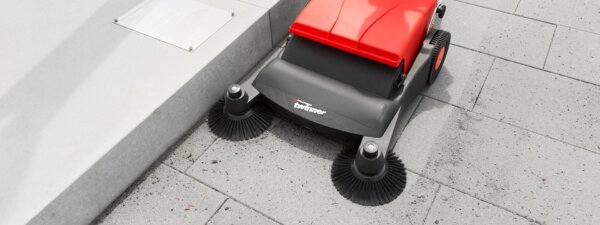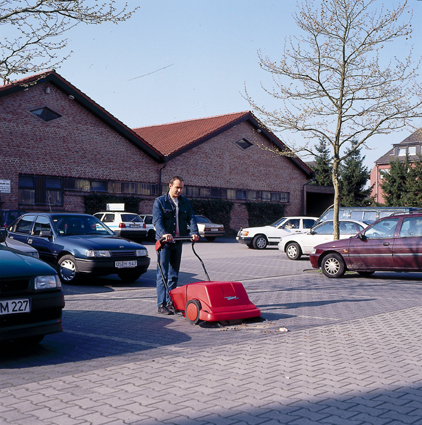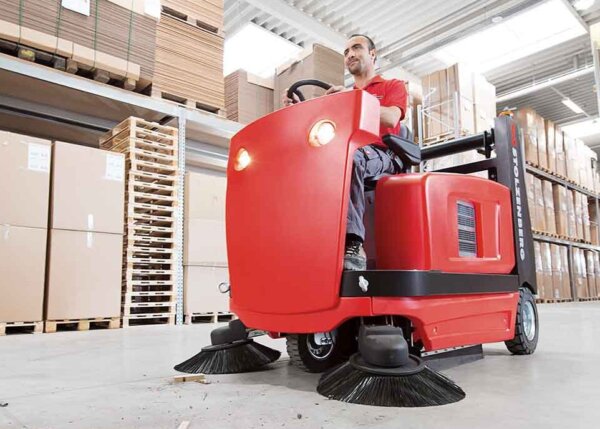Manual Sweepers vs. Battery-Powered Sweepers
Choosing the Right Cleaning Solution with Proquip NZ’s Stolzenberg Range

When it comes to maintaining clean and tidy spaces, whether it’s a commercial facility, a warehouse, or an outdoor area, the choice of a sweeper plays a pivotal role. Proquip NZ understands the importance of this decision, which is why we offer a comprehensive range of Stolzenberg sweepers.
In this blog post, we’ll delve into the differences between manual sweepers and battery-powered sweepers, highlighting their advantages and disadvantages, and exploring which tasks and environments each is best suited for.
Understanding the Basics
Before we dive into the specifics, let’s establish a foundational understanding of what manual and battery-powered sweepers are.
Manual Sweepers:
Manual sweepers are traditional, non-motorised cleaning machines that rely on human power to operate. These sweepers are equipped with brushes or rollers that rotate as the user pushes or walks behind the machine. The sweeping action collects debris and dust into a collection bin or hopper for later disposal. With manual sweepers the important thing to note is: no push = no sweep.
Battery-Powered Sweepers:
Battery-powered sweepers, on the other hand, are motorised cleaning machines that run on rechargeable batteries. These sweepers feature rotating brushes, vacuum systems, and a hopper to collect dirt and debris. They are designed to provide a more efficient and less labor-intensive cleaning process.
Now that we have a basic understanding, let’s explore the advantages and disadvantages of each type of sweeper.
Manual Sweepers: The Pros and Cons

Advantages of Manual Sweepers
Cost-EfficientOne of the most significant advantages of manual sweepers is their affordability. They are typically much cheaper than their battery-powered counterparts, making them a cost-effective choice for small businesses and budget-conscious customers. |
Environmentally FriendlyManual sweepers are eco-friendly because they don’t rely on electricity or batteries. They have a minimal carbon footprint, making them a sustainable choice for those who prioritise environmental responsibility.
|
Low MaintenanceThese sweepers are relatively simple machines with fewer moving parts, resulting in lower maintenance costs. They are easy to clean and maintain, reducing the need for frequent servicing. |
Quiet OperationManual sweepers operate quietly, which is beneficial in noise-sensitive environments such as residential areas, early morning or late-night cleaning, or areas where minimal disruption is essential. |
Disadvantages of Manual Sweepers
Limited EfficiencyOne of the primary drawbacks of manual sweepers is their limited cleaning efficiency. They are best suited for small areas with light to moderate debris. They are not effective at cleaning fine dust. Cleaning large or heavily soiled spaces with a manual sweeper can be time-consuming and physically demanding. |
Labour-IntensiveUsing manual sweepers requires physical effort from the operator, which can be exhausting over extended periods. This limitation can lead to reduced cleaning productivity. |
Not Suitable for All SurfacesManual sweepers may struggle to clean certain surfaces, especially uneven or rough ones. They are generally more effective on flat and smooth surfaces. |
Limited Hopper CapacityThe collection bins or hoppers on manual sweepers are relatively small compared to battery-powered models. This means more frequent emptying and interruptions during the cleaning process. |
Ideal Applications for Manual Sweepers

-
Small Retail Stores: Manual sweepers are suitable for small shops, boutiques, and convenience stores with limited floor space.
-
Residential Areas: They work well for cleaning driveways, patios, and other residential outdoor areas.
-
Light Industrial Spaces: In environments with minimal debris, such as small warehouses or workshops, manual sweepers can be a viable option.
Battery-Powered Sweepers: The Pros and Cons

Advantages of Battery-Powered Sweepers
High Cleaning EfficiencyBattery-powered sweepers are designed for efficiency. They can cover larger areas and handle heavier debris loads than manual sweepers, making them suitable for demanding cleaning tasks.
|
Labour SavingsOperators of battery-powered sweepers experience less physical strain because the machine does the heavy lifting. This results in increased cleaning productivity and less fatigue. |
Dust ControlEquipped with dust control systems and high-efficiency filters, battery-powered sweepers vacuum airborne dust particles for a safer, cleaner workplace. Learn more about dust control in our blog ‘Do you have a workplace dust issue?’ |
Suitable for Various SurfacesThese sweepers are generally better equipped to clean a variety of surfaces, including uneven or rough terrain. They can handle indoor and outdoor cleaning tasks with ease. |
Disadvantages of Battery-Powered Sweepers
Initial CostBattery-powered sweepers are more expensive upfront compared to manual sweepers, however, their long-term benefits outweigh the initial investment. You may consider finance options, such as Proquip Lease and Proquip DelayPay.
|
MaintenanceThese machines have more complex systems, which require frequent servicing. Regular battery maintenance is also necessary. Proquip offers scheduled maintenance plans for customers based in Auckland and Wellington. We also have an extensive network of approved service providers. Learn more about Proquip Service here |
Noise LevelWhile not as loud as some industrial equipment, battery-powered sweepers can be noisier than manual sweepers. This can be a consideration in noise-sensitive areas.
|
Battery LifeThe runtime of a battery-powered sweeper depends on the size of the battery and the intensity of use. Users may need to plan for recharging breaks during extended cleaning sessions.
|
Ideal Applications for Battery-Powered Sweepers

-
Large Warehouses: Battery-powered sweepers are excellent for efficiently cleaning extensive indoor spaces with high traffic and debris.
-
Industrial Facilities: They are suitable for manufacturing plants, factories, and other industrial environments that require heavy-duty cleaning.
-
Shopping Centers: Battery-powered sweepers can maintain the cleanliness of large retail spaces with ease.
-
Parking Lots: For outdoor cleaning tasks, including parking lots and open areas, battery-powered sweepers are a valuable asset.
Making the Right Choice
Choosing between manual sweepers and battery-powered sweepers from Proquip NZ’s Stolzenberg range ultimately depends on your specific cleaning requirements, budget, and preferences.
Talk to our friendly team today and let us help you with a sweeping solution that suits your needs.
Get in touch
Explore our Sweeper Range here